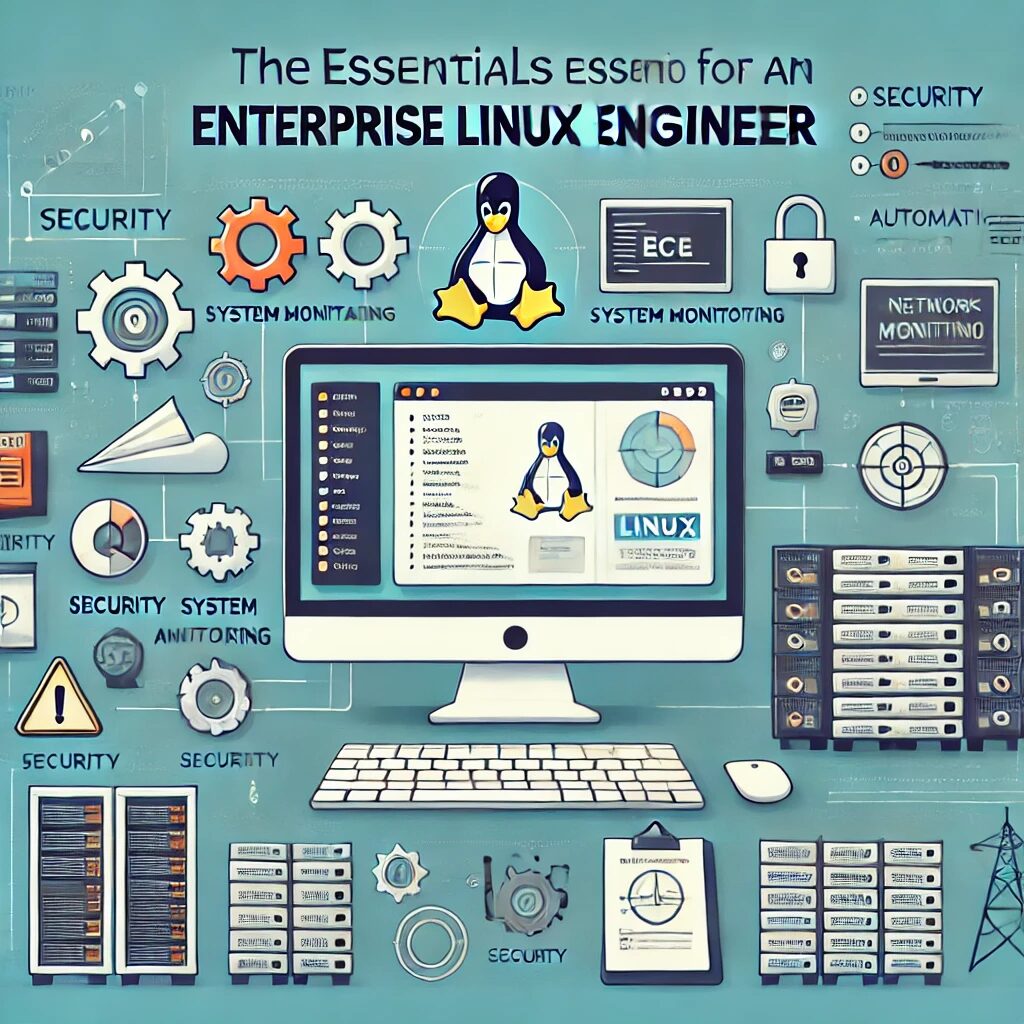As enterprises increasingly depend on robust, scalable, and secure infrastructure, the role of a Linux engineer has become critical. These professionals are at the heart of managing and optimizing Linux-based systems that power the backbone of enterprise IT operations. To excel in this field, it’s imperative to master and continuously sharpen a set of core skills that ensure the reliability, performance, and security of enterprise systems. This article delves into these critical skills, providing a roadmap for both aspiring and seasoned Linux engineers.
1. Deep Understanding of Linux Systems and Architecture
A profound comprehension of the Linux operating system is foundational. This includes:
- Kernel Architecture: Understanding how the Linux kernel works, including process management, memory management, and file systems.
- Command Line Proficiency: Mastery of shell environments (bash, zsh, etc.), command-line utilities, scripting, and automation.
- System Services and Daemons: Knowledge of managing system services, understanding init systems (Systemd, Upstart), and creating and managing custom services.
Sharpening the Skill:
- Practical Application: Regularly work on personal or open-source projects that require custom kernel configurations or scripting.
- Advanced Certifications: Pursue certifications such as Red Hat Certified Engineer (RHCE) or Linux Professional Institute Certification (LPIC).
2. System Administration and Management
Efficiently managing Linux systems involves a suite of administrative tasks:
- User and Group Management: Creating and managing user accounts, setting permissions, and ensuring secure access controls.
- Package Management: Understanding and using package managers (apt, yum, dnf, etc.) to install, update, and manage software.
- System Monitoring and Performance Tuning: Utilizing tools like Nagios, Zabbix, or Prometheus to monitor system performance and employing tuning techniques to optimize resources.
Sharpening the Skill:
- Simulation and Labs: Set up virtual environments to practice user management, package installations, and performance tuning.
- Community Engagement: Participate in forums and contribute to discussions on best practices in system administration.
3. Networking
Networking is a pivotal aspect of enterprise Linux engineering:
- Networking Fundamentals: Knowledge of TCP/IP, DNS, DHCP, and other networking protocols.
- Configuration and Troubleshooting: Setting up and managing network interfaces, firewalls (iptables, firewalld), and diagnosing network issues.
- Advanced Networking: Understanding VPNs, VLANs, and load balancing.
Sharpening the Skill:
- Certifications: Obtain certifications like CompTIA Network+ or Cisco’s CCNA for a solid networking foundation.
- Practical Experience: Engage in hands-on network setup and troubleshooting within enterprise environments or through lab simulations.
4. Security
Security is paramount in enterprise environments:
- Hardening Systems: Applying best practices for securing Linux servers, including SELinux or AppArmor configurations.
- Vulnerability Management: Regularly updating systems, patch management, and understanding common vulnerabilities and exposures (CVEs).
- Incident Response: Developing skills to detect, respond to, and mitigate security incidents.
Sharpening the Skill:
- Security Certifications: Earn certifications such as Certified Information Systems Security Professional (CISSP) or CompTIA Security+.
- Continuous Learning: Stay updated with the latest security trends, vulnerabilities, and mitigation strategies through platforms like Cybersecurity and Infrastructure Security Agency (CISA) and OWASP.
5. Automation and Scripting
Automation is a cornerstone of efficient systems management:
- Scripting Languages: Proficiency in scripting languages like Bash, Python, or Perl to automate repetitive tasks.
- Configuration Management: Utilizing tools like Ansible, Puppet, or Chef to automate system configuration and deployment.
- CI/CD Pipelines: Understanding and implementing continuous integration and continuous deployment practices to streamline software delivery.
Sharpening the Skill:
- Project Work: Implement automation in personal projects or contribute to open-source automation tools.
- Advanced Courses: Take advanced courses in scripting and automation tools to stay abreast of new techniques and tools.
6. Cloud and Virtualization
With the advent of cloud computing, understanding cloud environments and virtualization is crucial:
- Virtualization Technologies: Knowledge of hypervisors like KVM, VMware, and containerization with Docker.
- Cloud Platforms: Proficiency in cloud platforms such as AWS, Azure, or Google Cloud, and understanding their service offerings.
- Hybrid Cloud Management: Managing and orchestrating workloads across on-premises and cloud environments.
Sharpening the Skill:
- Hands-on Experience: Experiment with setting up virtual machines and containers, and deploy applications on various cloud platforms.
- Certifications: Obtain cloud certifications like AWS Certified Solutions Architect, Google Cloud Professional Cloud Architect, or Microsoft Certified: Azure Administrator Associate.
7. DevOps and Collaboration
The DevOps culture fosters collaboration between development and operations teams:
- DevOps Principles: Understanding the principles of DevOps, including collaboration, communication, and integration.
- Tools and Practices: Familiarity with DevOps tools like Jenkins, Git, Docker, and Kubernetes.
- Agile Methodologies: Implementing agile methodologies to enhance collaboration and improve project delivery.
Sharpening the Skill:
- Collaborative Projects: Work on cross-functional teams to implement DevOps practices in real-world scenarios.
- Continuous Learning: Attend DevOps workshops, webinars, and read literature to keep up with evolving practices.
Conclusion
Mastering and continually enhancing these critical skills is essential for any enterprise Linux engineer. The dynamic nature of technology requires a commitment to lifelong learning and adaptability. By focusing on these areas, engineers can ensure they remain indispensable assets in the ever-evolving landscape of enterprise IT.




